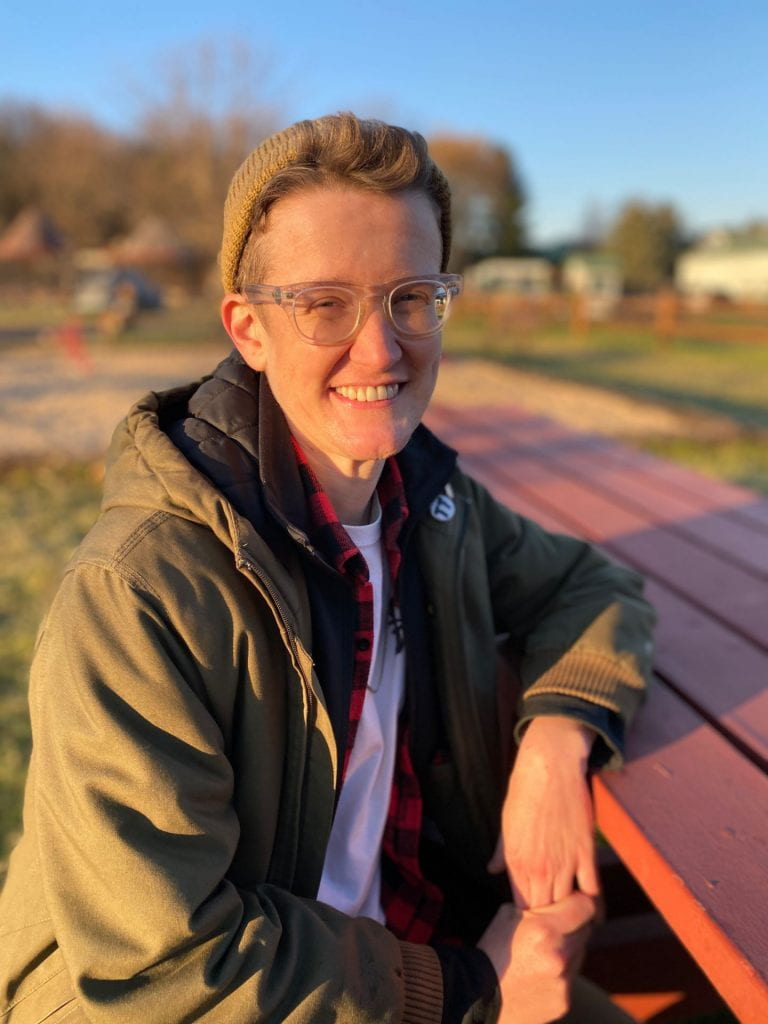Faculty Recipients of CFAR Pilot Awards Conduct Preliminary Studies in HIV Research
Transmasculine folx have really not had much space in the SGM health and HIV prevention arenas. That’s why it’s actually very important for me that this is a qualitative project”
Ricky Hill, PhD
Research Assistant Professor
Institute for Sexual and Gender Minority Health and Wellbeing (ISGMH) faculty members Ricky Hill, PhD, and Elissa Sarno, PhD, have been awarded pilot grants from the Third Coast Center for AIDS Research to conduct yearlong preliminary studies that will lead to new NIH grant submissions.
Understanding HIV Risk and Prevention Among Transgender Men
 Ricky Hill, PhD, a research assistant professor at ISGMH, will enroll 30 transgender men who have sex with men (TMSM) in five focus groups to examine risk for HIV and participant preferences for HIV prevention services. Hill’s goal with their research is to shine a light on a critically understudied section of the sexual and gender minority (SGM) community.
Ricky Hill, PhD, a research assistant professor at ISGMH, will enroll 30 transgender men who have sex with men (TMSM) in five focus groups to examine risk for HIV and participant preferences for HIV prevention services. Hill’s goal with their research is to shine a light on a critically understudied section of the sexual and gender minority (SGM) community.
“When we are talking about HIV prevention, the focal point has always been about cisgender men. And when we talk about transgender health in HIV prevention, we normally only hear about transgender women. But we know that there’s risk for TMSM—we know that transgender men are partnering with cisgender men sexually; we just don’t hear much about this risk.”
This dearth of data on transmasculine individuals has long been an issue when doing data analysis, but Hill credits the Inter-CFAR Transgender Health Working Group with bolstering their commitment to pursuing this research.
“The working group is a great space that introduced me to other trans health researchers I had no access to before. Working with other members, it became very clear to me this data is something that is needed. The risk exists, but we have not really started to understand it. And being a part of that working group really illustrated to me again that the field is ready. I feel ready, and I look forward to both mentoring and being mentored by others in this group. I’m excited to bring this type of work to my community and hopefully be a good steward of this money and of this research.”
Hill’s long-term goal for this research is to develop targeted intervention strategies for TMSM using the responses from participants in the focus groups while taking advantage of the wealth of resources available to them from other ISGMH faculty and projects already working in the same field.
“These focus groups finally allow us to hear from trans men about what they would like instead of a bunch of researchers making assumptions. The goal is to take that information and see what we can overlay onto what already exists. After synthesizing the data from these focus groups, I would love to see what kind of interventions ISGMH already works on that could be adapted for transmasculine folx who are having sex with cisgender men. If we don’t have to reinvent the wheel, we can build on the capacity we already have.”
Hill also emphasizes the importance and the value of transmasculine visibility in their work—both for research leaders and for participants.
“Transmasculine folx have really not had much space in the SGM health and HIV prevention arenas. That’s why it’s actually very important for me that this is a qualitative project. Focusing on the words, emotions, and desires of the participants, I will do my best to not quantify that and let the voices of those who I’m working with shine through. What I also think is exciting about this research is that it is being led by a transmasculine person, and I think that is an invaluable component. I’ve been working in this field for more than a decade, and this is the first project led by a trans person that I’ll be working on. The power has been in the hands of cisgender researchers for so long, so adding this to the ISGMH portfolio is a point of pride for me because this is now one more space where that power share is occurring, and I am excited to be a possibility model for other trans researchers.”
Examining Partner Risk Heuristics and Influence on Sexual Behavior in YMSM
 Elissa Sarno, PhD, a research assistant professor at ISGMH, will conduct in-depth interviews with 60 young men who have sex with men (YMSM) to understand the complex influences of partner risk heuristics—cognitive shortcuts used to determine the HIV/STI risk presented by potential partners—on sexual behavior. Sarno hopes to illuminate a missing piece in research on risk assessment and sexual behavior in YMSM.
Elissa Sarno, PhD, a research assistant professor at ISGMH, will conduct in-depth interviews with 60 young men who have sex with men (YMSM) to understand the complex influences of partner risk heuristics—cognitive shortcuts used to determine the HIV/STI risk presented by potential partners—on sexual behavior. Sarno hopes to illuminate a missing piece in research on risk assessment and sexual behavior in YMSM.
“A lot of HIV prevention is focused on important predictors of taking steps to reduce risk or ways to boost self-efficacy. What I think is missing is consideration of how our perceptions play sometimes unconscious roles in how we make decisions about our health.”
Sarno’s research is a continuation of previous work. For her dissertation, she conducted a study where YMSM subjects responded to photos of male-presenting people and found that partners perceived to be physically attractive were also assumed to be healthy, trustworthy, and HIV-negative. These assumptions affect sexual risk behavior because subjects reported they were less likely to use condoms when responding to photos of more attractive potential partners whom they deemed lower risk.
Sarno knew from her experience as an HIV test counselor, however, that individuals consider more than just attractiveness when making decisions about a partner.
“People would tell me they didn’t feel the need to use condoms with partners who ‘looked clean’ or ‘seemed trustworthy’ and when pressed more they didn’t really have much evidence about their partner’s HIV or STI status, their testing patterns, or whether they were on PrEP. I heard things like ‘he’s a good guy’ or ‘we know him very well’ that conveyed this perceived sense of safety around certain people that didn’t have a lot to do with health information, even if they acknowledged that wasn’t the most reliable system.”
During her postdoctoral fellowship, Sarno spent time looking at risk heuristics quantitatively using a daily diary study, but is now eager to look at the highly nuanced situation from a qualitative lens to gain a fuller picture of how these decisions are being made and what influences—conscious or not—exist.
“When you look at someone, you make all sort of micro decisions in the moment about them. A lot of things go into those assumptions, whether it be their race, their ethnicity, their age, or how they present in terms of gender. A lot of these decisions are based on stereotypes that are grounded in prejudice. We may be hesitant to admit our biases are impacted by racism, sexism, and cissexism, but I think it’s undeniable that those are a part of what goes into these perceptions of others.”
Sarno hopes her continuation of this research will lead to important developments in intervention.
“I think what we learn in this qualitative extension is really going to help us inform new interventions or modify existing ones to address this aspect of health-related decision-making. It’s something not based on health information, self-efficacy, knowledge, or motivation—it’s based on biases. I would love for HIV reduction interventions to start incorporating the question, ‘How do we address the role that biases play?’ into the work.”
Sarno also emphasizes the importance of intervention strategies that are empowering for subjects.
“It’s important to ask ourselves how we can approach this in a way that doesn’t feel punitive and can be positive and affirming. When we’re talking about sexual minority men, we’re talking about a group of people whose sexual experiences have been centered around risk rather than pleasure, which is a negative reality that sometime people want to escape from. So my hope is that these respondents can help us approach intervention strategically and sympathetically: how are they making these decisions, but also how can we empower them to adopt new behaviors that protect them and allow that same peace of mind?”